

Ó Gadhra. Ó Gadhra or O'Gara is an Irish surname which originated in the kingdom of Luighne Connacht.
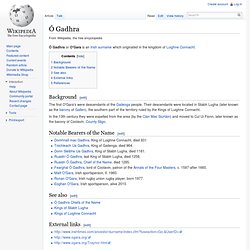
Background[edit] In the 13th century they were expelled from the area (by the Clan Mac Siúrtáin) and moved to Cul Ui Fionn, later known as the barony of Coolavin, County Sligo. Notable Bearers of the Name[edit] Domhnall mac Gadhra, King of Luighne Connacht, died 931.Toichleach Ua Gadhra, King of Gailenga, died 964.Donn Sléibhe Ua Gadhra, King of Sliabh Lugha, died 1181.Ruaidrí Ó Gadhra, last King of Sliabh Lugha, died 1256.Ruaidri Ó Gadhra, Chief of the Name, died 1285.Fearghal Ó Gadhra, lord of Coolavin, patron of the Annals of the Four Masters, c. 1597-after 1660.Matt O'Gara, Irish sportsperson, fl. 1960.Ronan O'Gara, Irish rugby union rugby player, born 1977.Eoghan O'Gara, Irish sportsperson, alive 2010.
See also[edit] External links[edit] References[edit] Peerage of Ireland. List of Celtic tribes. The spread of Celtic culture in Europe: core Hallstatt territory, by the 6th century BC maximal Celtic expansion, by the 3rd century BC Lusitanian area of Iberia where Celtic presence is uncertain.
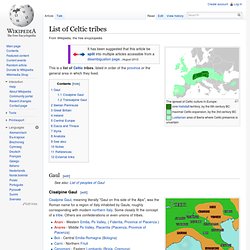
Monarchy of Ireland. A monarchical polity has existed in Ireland during three periods of its history, finally ending in 1801.
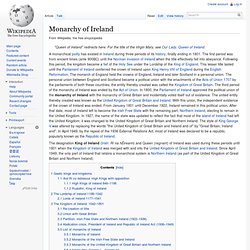
The first period was from ancient times (ante 900BC) until the Norman invasion of Ireland when the title effectively fell into abeyance. Traditional Irish Names in Gaelic. Belfast Agreement. The Good Friday Agreement or Belfast Agreement or as it is informally abbreviated as the GFA (Irish: Comhaontú Bhéal Feirste or Comhaontú Aoine an Chéasta; Ulster-Scots: Bilfawst Greeance or Guid Friday Greeance)[1] was a major political development in the Northern Ireland peace process of the 1990s.
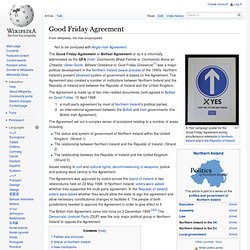
Northern Ireland's present devolved system of government is based on the Agreement. The Agreement also created a number of institutions between Northern Ireland and the Republic of Ireland and between the Republic of Ireland and the United Kingdom. The Agreement is made up of two inter-related documents, both agreed in Belfast on Good Friday, 10 April 1998: a multi-party agreement by most of Northern Ireland's political parties;an international agreement between the British and Irish governments (the British-Irish Agreement).
The Agreement set out a complex series of provisions relating to a number of areas including: Parties and structure[edit] Cú Chulainn. "Cuchulain Slays the Hound of Culain", illustration by Stephen Reid from Eleanor Hull's The Boys' Cuchulain, 1904.
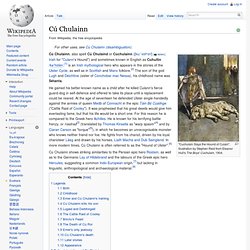
Cú Chulainn, also spelt Cú Chulaind or Cúchulainn ([kuːˈxʊlˠɪnʲ] ( ); Irish for "Culann's Hound") and sometimes known in English as Cuhullin /kəˈhʊlɨn/,[1] is an Irish mythological hero who appears in the stories of the Ulster Cycle, as well as in Scottish and Manx folklore.[2] The son of the god Lugh and Deichtine (sister of Conchobar mac Nessa), his childhood name was Sétanta. He gained his better-known name as a child after he killed Culann's fierce guard-dog in self-defence and offered to take its place until a replacement could be reared.
At the age of seventeen he defended Ulster single-handedly against the armies of queen Medb of Connacht in the epic Táin Bó Cúailnge ("Cattle Raid of Cooley"). It was prophesied that his great deeds would give him everlasting fame, but that his life would be a short one. Legends[edit] Birth[edit] Childhood[edit] Cú Chulainn in Battle. Irish mythology. Bunworth Banshee The mythology of pre-Christian Ireland did not entirely survive the conversion to Christianity.
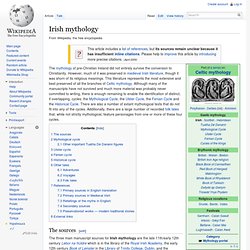
However, much of it was preserved in medieval Irish literature, though it was shorn of its religious meanings. This literature represents the most extensive and best preserved of all the branches of Celtic mythology. Although many of the manuscripts have not survived and much more material was probably never committed to writing, there is enough remaining to enable the identification of distinct, if overlapping, cycles: the Mythological Cycle, the Ulster Cycle, the Fenian Cycle and the Historical Cycle. There are also a number of extant mythological texts that do not fit into any of the cycles. CAIN: Northern Ireland Conflict, Politics, & Society. Information on 'the troubles' Frontline: behind the mask - the ira & sinn fein.